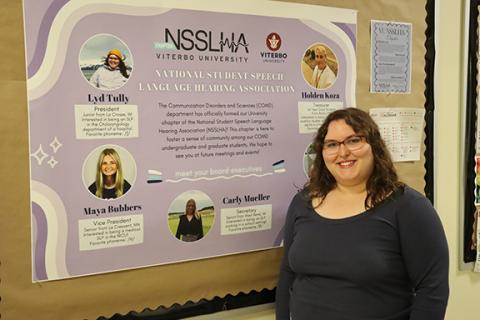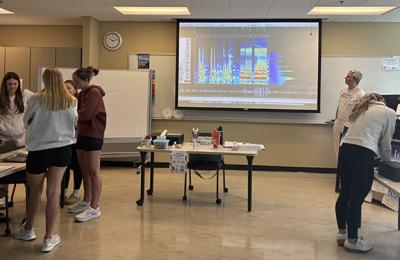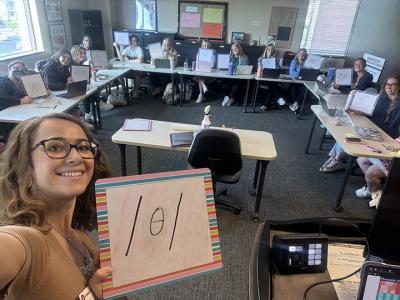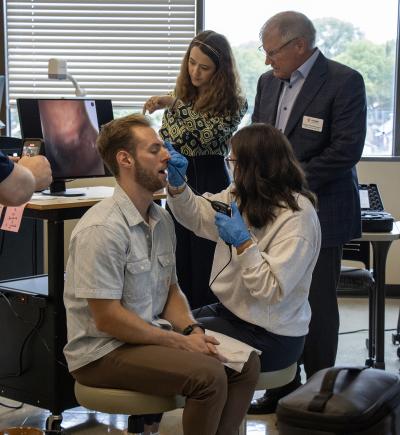Lydia Tully had trouble pronouncing certain sounds when she was a child. Not an unheard of problem for elementary school students her age, regular sessions with Mrs. Engebretson, her Emerson Elementary School speech therapist, solved the issue and put her on track for perfect speech.
Those speech therapy sessions were Tully’s favorite part of school. In addition to alleviating her pronunciation difficulties, they also sparked a life-long interest in the voice and speech. As she got older, her additional interest in the medical profession had her wondering if she could combine the two into a career. A simple internet search gave her the answer.
“Speech-Language Pathology was the first thing to come up,” Tully said. “I thought it was just for kids in elementary schools, but Speech-Language Pathologists work with patients of all ages in hospitals, clinics, nursing homes, and other settings. I was really excited by all the different avenues that can be taken in this career.”
Today as a junior majoring in Communication Disorders and Sciences at Viterbo University, Tully is well on her way to becoming a practicing member of her chosen profession.
“It’s going very well,” Tully said of her experience in the major and at Viterbo overall. “I love the academic program and the professors are very good at teaching.”
Tully’s favorite part so far as been fulfilling the required observation hours needed to graduate. She’s had the opportunity to observe professionals treating patients in a variety of settings throughout La Crosse.
“That confirmed my career choice 100 percent,” she said. “I loved all of it. Observing the speech therapist at Emplify Health reinforced my desire to eventually work in a hospital and I even got to shadow Mrs. Engebretson at Emerson Elementary, so that brought everything full circle.”
Her time at Viterbo is allowing Tully to explore other interests as well. She has minors in American Sign Language and music and is the university’s National Student Speech, Language, and Hearing Association chapter president, a campus organization she helped to established.
“I love building a community within my major and bonding with people who are learning the same things,” said Tully, who plans to graduate from Viterbo University in May 2027, after which she will go on to earn a master’s degree in Speech-Language Pathology.
The Communication Disorders and Sciences undergraduate major at Viterbo is providing Tully and other cross-departmental students with a unique program that provides rare and sought-after cross-curricular offerings, preparing them well for graduate school and various future healthcare or science careers, said Viterbo faculty member Dr. Theodora Nestorova. It is also a perfect precursor to the university’s Master of Speech-Language Pathology program.
For example, the Introduction to Phonetics class that Nestorova teaches at Viterbo is specifically designed for a combination of Communication Disorders and Sciences and music students from the Conservatory for the Performing Arts. Phonetics, defined as the study of speech sounds and their physiological production and acoustic qualities, is a crucial aspect of both professions. The mix of majors brings what Nestorova called a “symbiotic” learning of the curriculum, with each major bringing their own specialized area of knowledge to the class. Normally, the music students take Introduction to Lyric Diction (MUSC 237) and the Communication Disorders & Sciences students take Introduction to Phonetics (COMD 312). This fall 2025 semester, for the first time, this course is cross-listed and taught by Nestorova in one blended course.
“The fact that we’re able to offer such an integrated class like this makes Viterbo unique,” said Nestorova, who teaches in both Viterbo’s Communication Disorders and Sciences undergraduate major and its Speech-Language Pathology master’s degree program. “It will have a real-world practical application in their future careers. I present at both regional and national conferences, and my colleagues continuously remark that they wish they could structure their curriculum like we are at Viterbo, especially with all of the interprofessional education. As our program, led by director and chair Dr. Patti Johnstone grows, we can envision more opportunities for interdisciplinary initiatives with students from STEM majors across Viterbo’s campus. This enriches the educational opportunities and possibilities with potential for unique minors, certificate programs, and degree tracks. Our Communication Disorders co-faculty and I really think the seed has just been planted.”
Nestorova also supervised Tully’s Summer Undergraduate Research Fellowship (SURF) project on a topic that crosses both Speech-Language Pathology and Music, which was accepted as a presentation at this year’s national American Speech-Language-Hearing Association (ASHA) Convention in Washington D.C.
Like her colleagues, Nestorova brings a considerable real world and academic experience to her position at Viterbo. She is an accomplished and award-winning voice scientist and vocalist whose cross-disciplinary voice, resonance, and upper airway research has been published in numerous academic journals. Nestorova also owns and manages a global company specializing in academic consultation, multilingual phonetics/lyric diction/pronunciation/accent coaching, and singing/speaking voice teaching and rehabilitation. Synergizing art and science, she performs in Pizzicanto Soprano-Cello Duo with her husband, Alex Fowler, cellist and adjunct professor of String Techniques at Viterbo, and frequently collaborates with the Conservatory for the Performing Arts.
Explore the Program
Turn your curiosity about speech, language, and hearing into action. Viterbo’s communication disorders and sciences program gives you the skills and experience to help people communicate with confidence.
To apply, visit https://www.viterbo.edu/admissions-and-aid.




